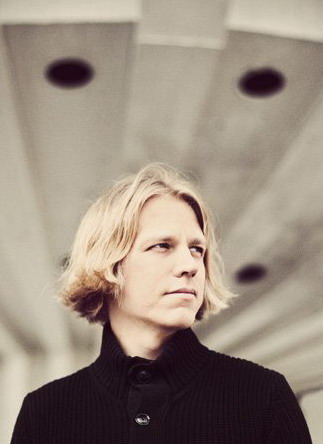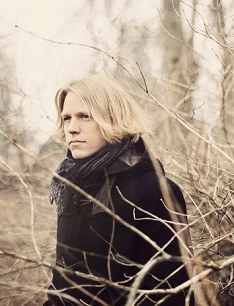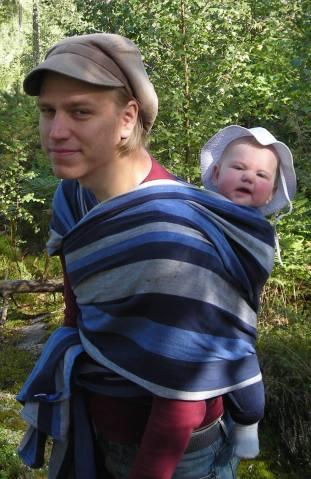|
AV: Do you remember when it was that you first
started to take an interest in electronic music? Who were some of the
first artists that you listened to and what was it about their music
that caught your attention?
JA: I think it started when a classmate of mine gave me a
mixtape with italo disco (a style of 80s disco coming from Italy) when I was 10
years old. Until then I had mostly listened to Swedish mainstream pop like
Europe and Roxette. There was something about electronic sounds that grabbed
me, a clearness of the sounds. A few years later I discovered ambient music
(Biosphere, Future Sound of London, Aphex Twin) through specialty shows on the radio and MTV
Europe's Chill Out Zone. I spent all my pocket money on buying CDs from these
artists and Pet Shop Boys, The KLF, Moby, Kraftwerk etc.
AV: When did you start composing music of your own
and what style of music did you choose to begin with? Why?
JA: I have some tapes from when I was a child, playing the
piano and singing my own songs. My mum noticed that I tried to imitate the
English language before I was taught English in school. So I tried to make pop songs,
but when I was maybe 15-16 years old I turned to more instrumental forms of
electronic music, techno and ambient, reflecting the music I was listening to
at the time. By then I also bought myself my first music computer (an Atari)
and a sampler. For a long time I only made instrumental music because it gave
me bigger possibilities to be experimental. I more and more turned to rhythmic
electronic ambient music as my main genre. But since 2006 I've been making pop
music again (very much in the 80s disco style) since I love it as well.
AV: Did you have to make an investment in equipment
and software to get things rolling? What were some of the essential
pieces of equipment and software that you had to have to begin to create
and record your music?
|
|
|

|
JA: Yes, that was why it took until I was 27 years old before
I started to release my music. When I was 19, my Atari died, and before that I
had already felt that my set-up was too limited (Atari + sampler + Yamaha
keyboard). Since I was a poor student, I stopped making music until 2003 (when I was 25), when I realized that the processing
power of home computers had increased so much that you could record to hard
disk, add effects, and even use software synthesizers in the computer. So in
2004 I bought my Macintosh G4 "Jürgen" which I still use to make
music on. I rely on a lot of samples, especially waveforms sampled from old
tapes, to create an analog, slightly swaying sound of a lot of instruments.
For example I recorded the high-frequency sound of Aphex
Twin's "Ventolin" to tape, sampled it, and transposed it down a few
octaves, which created a warm pad sound. I mainly use Reason but I think 60-70%
of the sounds are samples.
|
AV: How easy is it for musicians such as yourself to
do all of their recording at home these days with computer based
digital equipment and software?
JA: Quite easy, I'd say. The difficult part is to find a way
to use the software in a way that nobody else does!
AV: Did you always intend to release your music for
sale when you first started to record? Was that your goal?
JA: Yes, since I was a teenager a goal was to release one
proper album on a proper label.
AV: Tell me about your interest in ambient music and
what you like about it.
JA: I like the feeling of being surrounded by a magical
landscape, or soundscape. I like the experimentation it allows and that you can
use all kinds of sounds (trains, computer game samples, whatever) and transform
them if you want. You can make tracks which are one minute long or fifteen
minutes long. It's a kind of freedom that you don't have in pop music.
AV: Has the inclusion of your music on several
compilation albums helped you to gain recognition as a composer?
JA: It's difficult to know! When tracks are posted on blogs
or other kinds of online stuff, it's quite common that I get some kind of
feedback from listeners. That hardly ever happens with compilation albums, but
maybe it's just because the step from listening to something online and posting
a shout to a Facebook page or something is probably pretty small.
AV: Has your study of psychology changed the way that
you approach your musical compositions? If so in what ways?
JA: I think it has helped me understand what I'm expressing
with my music, which is still difficult to put words to. I think that I'm
thinking a bit differently now about what music means to people and why people
have so diverse tastes in music. This is very abstract, and I don't have any
simple answers, I'm just thinking about it a lot, how music can almost be some
kind of therapy, a way to cope with feelings.
|
AV: Why did you create Husmus Media? Has your little
label been able to do what you
had hoped it would do when you started it?
JA: Yes, my goal was just to get some of my music down to a
physical format, to a form that will last a bit longer than the unpleasant (in
my opinion) format of mp3 files. I never sent any of the releases to reviewers,
I just wanted it available for myself and for the closest circle of listeners
(which weren't many in 2006), but I plan to re-release my piano album one day
now when I'm a bit more established.
AV: How did you first connect with Lotuspike/Spotted
Peccary music and why did you decide to release your music in the U.S.
through them?
|

|
JA: My friend Stefan Strand (a.k.a. Between Interval)
recommended me to send a demo to Lotuspike, since he thought my music would fit
there. He was signed to Spotted Peccary, but at the time, Lotuspike wasn't
connected to that label. Lotuspike showed interest in it and I thought why not.
Then Lotuspike became sort-of a sublabel of Spotted Peccary and so I and Stefan
became label mates.
AV: Tell me about your latest album The Mountain
Lake and what kind of music listeners can expect from it.
JA: "The Mountain Lake" is a collection of mostly
instrumental electronic ambient music from the last five years or so. Apart
from ambient, there are musical influences from Detroit electro, 80s disco and
a bit of Tibetan Buddhist music.
AV: How does The Mountain Lake compare to your other
release Mossebo from 2008? Similar? New direction?
JA: I'd say they are quite similar, but on Mossebo, half of
the tracks featured Lisa Barra on vocals, whereas she only sings on one track
on The Mountain Lake, which is more instrumental on the whole. But some of the
tracks on The Mountain Lake are older than some of the tracks on Mossebo, so I
wouldn't speak of a new direction, I'd rather view the two releases as two
chapters of the same story - hence the artwork is also very similar.
|
Ben Cox from Lotuspike Records has this to say about Joahn:
Our
connection with Johan originates from his friend Stefan Strand, who is perhaps
better known as Between Interval (on the Spotted Peccary "Wanderings"
imprint). Stefan introduced us to Johan, who sent us a demo that led to the release
of his solo ambient debut Mossebo. On Mossebo we worked with
Johan to select songs from his original recordings; I mastered the release, and
Jeff and Daniel did the package artwork. For The Mountain Lake, Johan
selected the tracks and again I mastered and Daniel did the artwork.
As
to the material on The Mountain Lake, the music is a blend of ambience
and rhythmic electronics. Not a pure "drift/float" ambient style, as
it incorporates some more overtly electronic tones and grooves, but definitely not
a dance record either (though Johan is no stranger to that scene, as you can
clearly tell by the tendencies here and from his discography elsewhere, both
solo and with Sally Shapiro). There are several collaborations and guest
artists (including a remix from Steve Moore) on The Mountain Lake as
well.
And
of course, beyond the material itself, we also really enjoy working with Johan,
who is a total pro in his approach to the music and all aspects of the process.
|
AV: You also work in a style of music that is
labeled as "neo-italo disco. Tell me about what kind of music this is and why is
it that you enjoy working in this genre.
JA: Well since italo disco was the first style of music I had
a deep, long-lived appreciation for, and a nerdy interest in, there's a lot of
nostalgia involved with working in the genre. I'd say I'm on the whole a very
nostalgic person, not just when it comes to music. Italo disco also can be a
lot of good things at the same time: danceable, poppy, melancholic,
atmospheric. I think my ambient music and my disco music have the melancholic
and the atmospheric vibes in common.
AV: How did you and Sally Shapiro start working
together?
JA: She was a close friend of mine and after a while -
actually not until after a few years - we discovered that we had the same
appreciation for 80s disco music. I also discovered that she had a very italo
disco-sounding voice. So when I had written the italo disco track "I'll Be
By Your Side" I asked her to sing on it. She did, and the result was so
good that we made a whole album...and then a second one.
|

|
AV: Is it difficult for you to go back and forth
between ambient music and disco music when you are composing? Tell me
about the elements that are shared between these two styles and how
they cross over between each other when you are composing music.
JA: I almost always know from the beginning if something is
going to be a disco track or an ambient track, since the disco music I make has
a very traditional pop structure, whereas the ambient music is more
experimental and slow moving. Like I said they have the melancholic harmonies
and a lot of reverb in common though. In the beginning I felt that it was
important to keep the two projects separated from each other, but during the
last few years I've let them pollinate each other sometimes. For example my remix
of Glass Candy's "The Chameleon" (included on The Mountain Lake) which is an ambient-ish
remix of a disco track, or "Take Me Home", or "The Stones Are
Blasted" (also on The Mountain Lake), which I later reworked into a track
called "Casablanca Nights" included on my latest disco album.
|
AV: When you are working with Sally Shapiro are you
strictly the composer? What other roles do you play when working on a Sally
Shapiro project release?
JA: I'm the composer and producer, sometimes together with
other people. Sometimes I also sing backing vocals. Then I take care of
all contacts with record labels, designers and so on because Sally is quite
uninterested in all that.
AV: Do you enjoy doing remixes of existing songs?
When you do a remix of a song what are you trying to accomplish with the
remixed version of the song?
JA: I usually think it's more interesting to compose than to
remix, but a few times a year I can get inspired by some track and get
some idea for how I could make it sound different. I try to bring out
the beauty of the song while applying my own way of producing.
AV: Do you enjoy wearing the producer hat when it
comes to the work you do with Sally Shapiro? What is it that you are responsible
for when you are the producer of a project instead of just the composer?
JA: I certainly enjoy producing more than singing...but
lately I've started to feel that what I really enjoy is composing. So I'm
nowadays often working together with other producers (for example
Lovelock and Le Prix) and focusing on the composition part. In the end I
usually get a lot of ideas related to the production anyway.
AV: What are some of your inspirations for the music
that appears on The Mountain Lake? Describe the process you go through
to take the inspirations that you get about where an album is headed and then
make them happen in your music as you compose it and record it.
JA: It can be so different. "The Stones Are
Blasted" started with a chord sequence and a melody in my head. "Zero
Gravitation" started by playing around with a string sound. "Swimming Through The
Blue Lagoon" started with waking up in the middle of the night with a memory
of a combination of tones. "Take Me Home" started
with a vocal sample that I built up the whole track around. After I have an idea to
start with, I work with the composition and production at the same time
until it's finished.
AV: Do you see the Internet as a help for musicians
to get their music out to not only local audiences but worldwide audiences
as well? In what ways has it taken your music further than it would have
gotten without the Internet?
JA: It's difficult to imagine getting the music "out
there" without the Internet today. For the Sally Shapiro project, MP3 blogs
were crucial to create an interest and getting us signed to record
labels. But non-commercial subgenres of music also existed before the
Internet, so maybe it would have found its way anyway.
AV: Any thoughts as to where your music is headed
next or what you'd like to experiment with in terms of styles?
JA: I'm already working on a few new ambient and disco
tracks, but another thing I would like to do is to experiment more with
involving the piano. I had a period when I composed for the piano a lot
- the tracks included on the piano album on Husmus Media - and I would
like to combine that with what I've been doing the latest years
and see where it takes me.
AV: What is it that you would like to pass along to
your daughter Siri in terms of what music has meant to you and what it
might mean to her in the future?
JA: I just want her to experience the joy in music and
sounds. We sing songs together and play the piano, sometimes we play
around with the sampler. (That's good for me too, because I need more of
a playful approach to music sometimes.) But I don't want to put
expectations on her to put a lot of effort in it. We don't come from
families where everyone is a musician. If she would later rather play
soccer or something then that's fine with me.
AV: Any final thoughts you'd like to share with the
readers of AV about your music or some of your personal philosophies that
have shaped how you approach music and life in general?
JA: That's a good question. I guess for both life in general
and making music I think: Allow yourself to be influenced by others,
because a lot
of people have come up with a lot of incredibly smart
things, but don't accept anything without reflecting and putting truths
into question.
AV: Well Johan I do thank you for taking the time to talk to me and share some of your thoughts with my readers here at Ambient Visions. I hope that you are successful in all the things you'd like to do and try and that your music will be around for a long time.
|